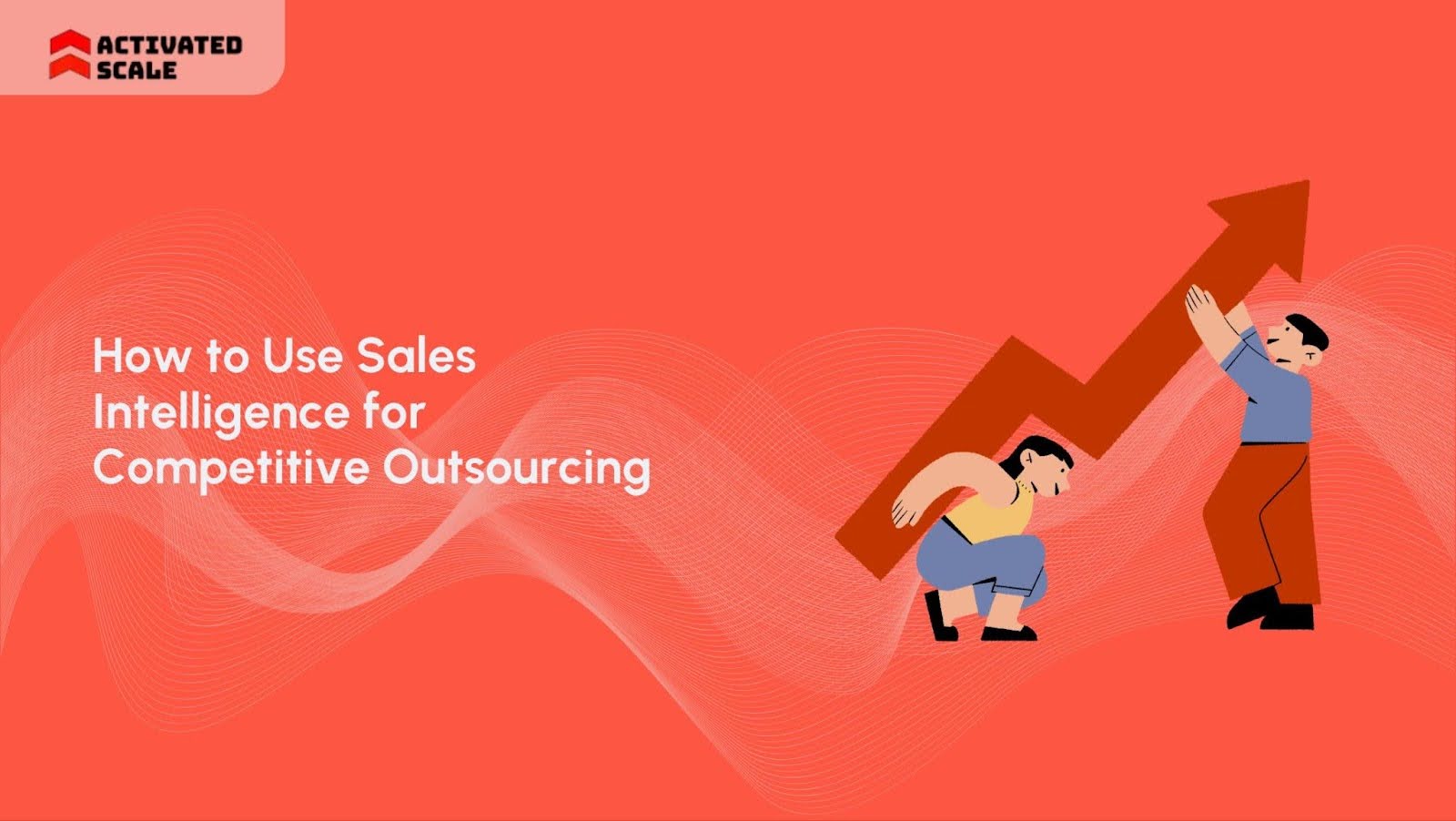Outsourcing is not easy in 2025. With businesses striving to find the best partners, having the right partner to make smarter decisions is crucial. How do you make sure you're not just picking a vendor, but the right one?
In fact, by 2030, the global sales outsourcing market is expected to grow at a CAGR of 9.4%. So, just like you, you can expect your competitors to use outsourcing. So, how do you make sure you are making an informed decision?
In this blog, we’ll show you how to use sales intelligence for outsourcing to stay ahead of your competitors. So, if you’re looking to reduce risks and identify top-tier partners, the insights shared here will be essential to your success.
Quick Overview
- Sales intelligence tools help businesses organize outsourcing decisions by providing actionable insights on potential partners.
- Key sales intelligence elements, such as stakeholder, technology, and industry intelligence, ensure well-informed outsourcing choices.
- Sales intelligence tools, powered by AI, automate data collection and analysis, enabling faster decision-making.
- The right sales intelligence software should integrate with your CRM and provide real-time updates to facilitate adoption.
- With smarter, data-driven decisions, sales intelligence tools reduce risks and enhance the effectiveness of outsourcing relationships.
What is Sales Intelligence?
In sales, having access to the right data before making a decision can significantly increase your chances of success. Similarly, using sales intelligence, you can dig into a vendor’s tech stack, recent client success stories, and organizational changes.
So, sales intelligence is the systematic process of collecting, analyzing, and applying valuable data to make decisions. This data enables businesses to understand market trends better.
So, even before scheduling a call, you ensure your solutions align with their goals. There are several key types of data within sales intelligence that businesses need to know. Those are:
- Firmographic Data: This includes information about a company’s industry, size, revenue, and other vital details. It helps identify if the outsourcing vendor fits your needs based on their operational scale and market presence.
- Contact Data: It contains personal data such as job titles, email addresses, and phone numbers. This allows businesses to connect with decision-makers directly to build better relationships.
- Technographic Data: You get insights into the technology stack that a company uses. Businesses can assess whether the vendor is equipped to handle their business needs with their technology.
- Sales Event Triggers: These are key events that indicate the right time to reach out. Examples include funding rounds, expansions, or shifts in leadership. These events can provide critical timing insights for initiating contact.
- Deal Data: This data gives a detailed view of an account’s past purchases and the sales process. Understanding these can highlight what worked for a prospect and what didn’t. In this way, you can improve your outsourcing approach.
To successfully handle the world of outsourcing, you need more than just basic data. To understand better, you need to know about core elements. This part of sales intelligence shares insights from technology capabilities to buyer motivations.
Also Read: Creating a Sales Strategy for Small Business Success
How to Use Sales Intelligence for Outsourcing?
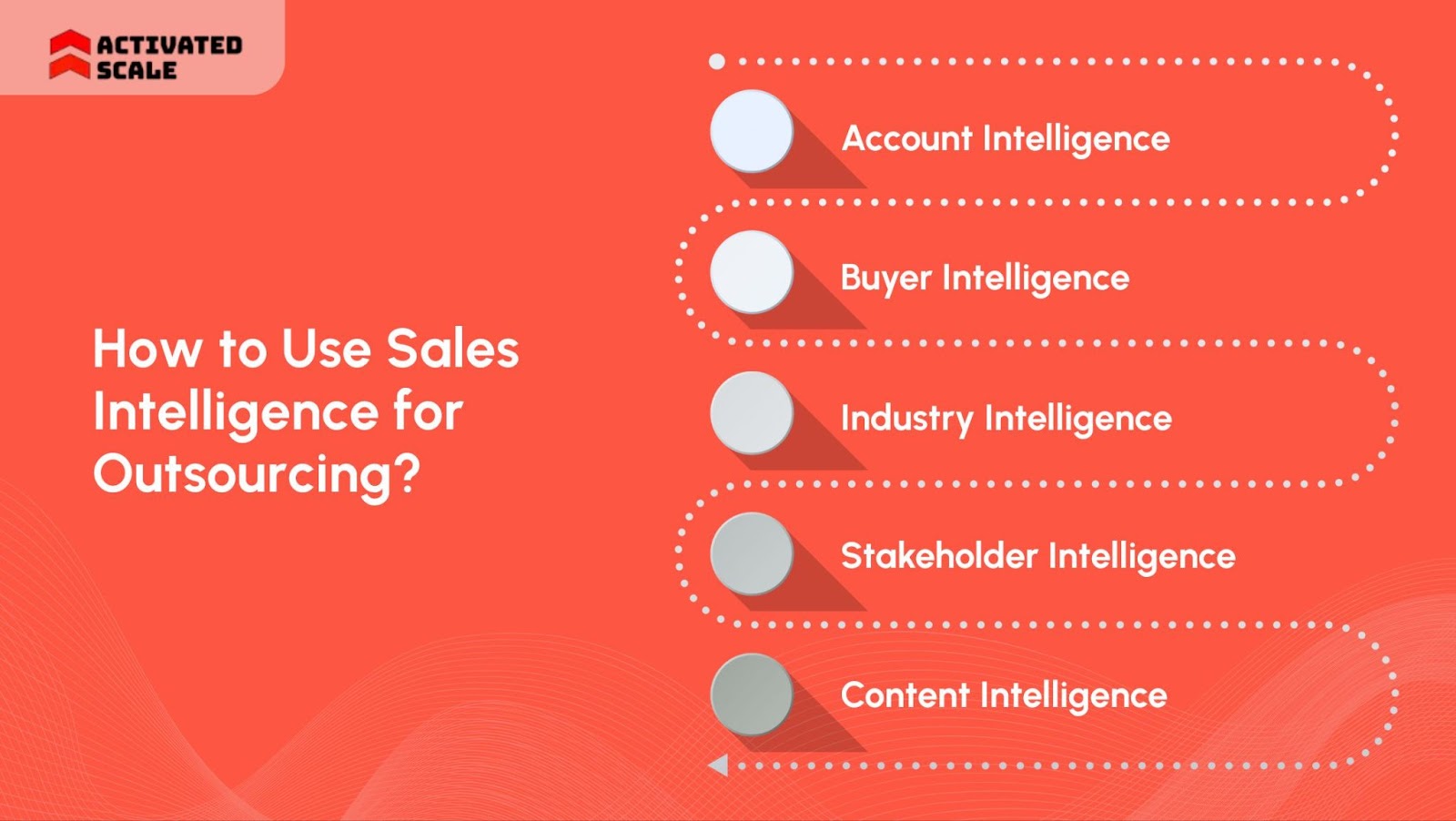
After spending years in outsourcing, we understood that not every client is suitable for our service. The same goes for you. No matter how fine-tuned the service an outsourcing partner provides you, it still feels short, sometimes. Result?
Overdue deadlines, escalation in pipeline, etc. Here’s why core elements of sales intelligence can be used for outsourcing:
1. Account Intelligence
It is all about gathering and analyzing data on your potential partner. This helps you gain a deeper understanding of their business challenges and goals. It includes understanding their financial health, past projects, and any obstacles they may face.
2. Buyer Intelligence
It gives you insight into their motivations, purchasing history, and the factors that drive their decisions. This allows you to better align your goals with their solutions. Communicate in a way that resonates with their buying behavior, improving your chances of forming a successful partnership.
3. Industry Intelligence
It involves gathering real-time data about trends, market conditions, and competitive forces in the industry your outsourcing partner operates in. Understanding these trends enables you to anticipate regulatory changes, technological advancements, or shifts in consumer behavior.
4. Stakeholder Intelligence
To successfully engage with potential outsourcing partners, it’s crucial to know who within their organization will drive the decision-making process. Stakeholder intelligence helps you identify the key players, such as executives, and understand their priorities.
5. Content Intelligence
It focuses on understanding the type of content that resonates with your outsourcing partner. What information are they engaging with? Are they more likely to respond to case studies, whitepapers, or industry reports? After analyzing their content consumption behavior, you can share your business needs in a discovery call.
So, in a nutshell, the benefits of sales intelligence include:
- Improved Data Quality: Ensures decisions are based on accurate, up-to-date information by cleaning and enriching data.
- Enhanced Market Research: Uncovers hidden opportunities, helping identify top vendors in new or untapped markets.
- Better Personalization: Allows for customized outreach strategies, increasing the chances of successful partnerships.
- Faster Sales Cycles: Real-time insights and predictive analytics help identify high-potential partners quickly.
- Increased Upselling and Cross-selling: Helps find opportunities to offer additional services based on ongoing partner needs.
At Activated Scale, we specialize in fractional sales leadership, helping businesses hire experienced VPs of Sales to craft go-to-market strategies. Our team is here to help you scale efficiently by giving you the flexibility of hiring on a trial basis.
80% of sales leaders are planning to implement AI in their customer relationship management (CRM). However, this integration will be successful if it is packed with necessary sales intelligence tools.
How Sales Intelligence Tools Work?
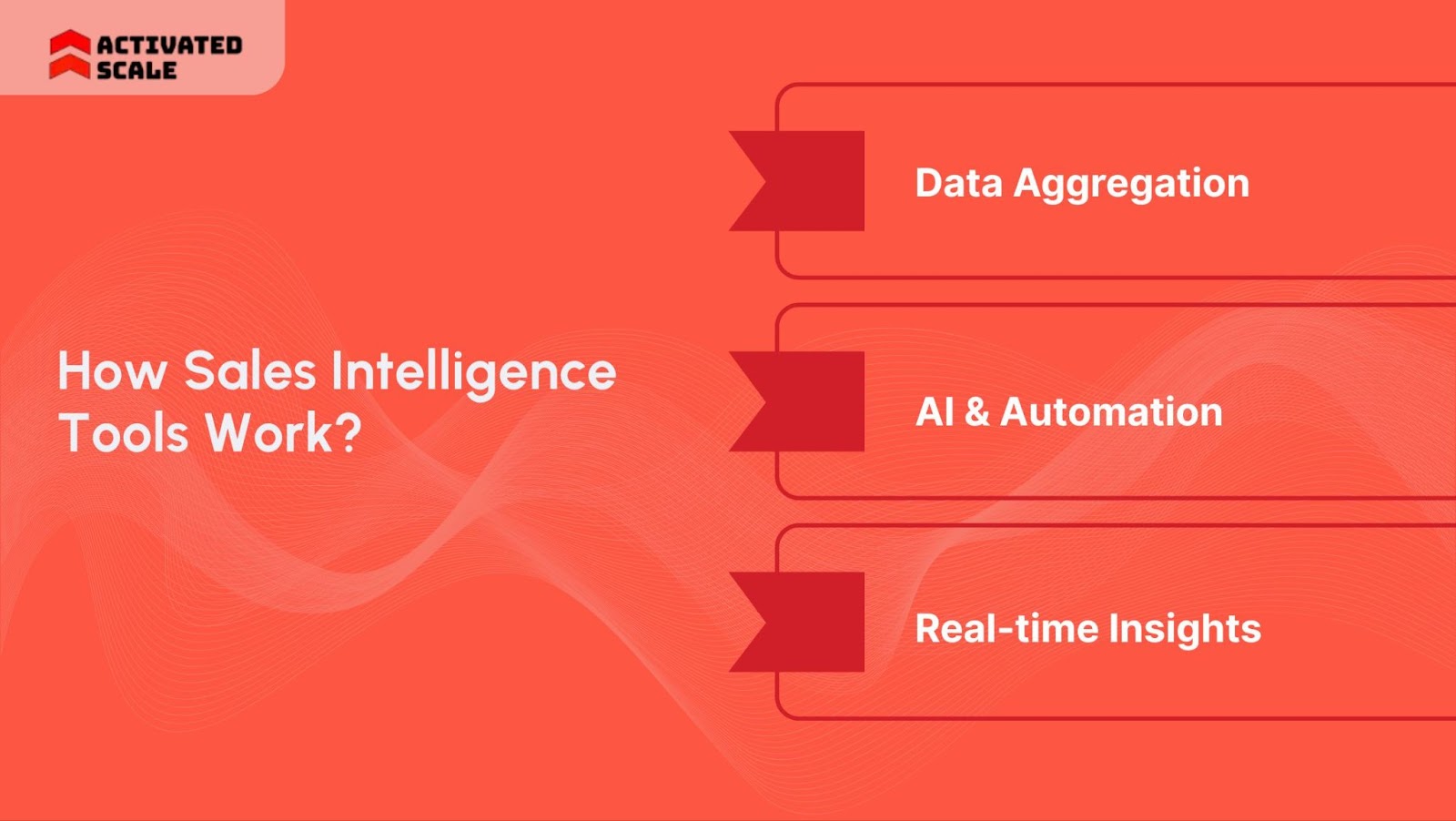
While sales intelligence provides the necessary data, sales intelligence tools are the key to turning that data into actionable insights. Without them, you're left with raw data that lacks the context and clarity needed to make informed outsourcing choices.
However, if you use sales intelligence tools, it will help you as follows:
- Data Aggregation
- Sales intelligence tools pull data from a variety of sources like CRM systems, websites, and social media platforms.
- All this information is then consolidated into a single, easy-to-understand dashboard.
- It provides a 360-degree view of potential outsourcing partners.
- This centralized approach ensures that no critical data is missed.
- AI & Automation
- AI-powered sales intelligence tools use advanced algorithms.
- It can predict customer behavior and automatically score leads based on their likelihood to convert.
- These tools also automate follow-up actions while saving your team time.
- Real-time Insights
- The real power of sales intelligence tools lies in their ability to provide continuous, real-time updates and recommendations.
- As your outsourcing needs change, these tools adjust to give you the most relevant insights.
- In this way, you can quickly respond to changing conditions and make decisions based on the latest information.
Read Also: Choosing a Top Outsourced SDR Company in the USA
To get the best benefits from them, you need to be sure you are choosing capable tools. What are those? Let’s find out.
5 Important Sales Intelligence Tools
From a small business, a fast-growing startup, or an established enterprise, your budget, needs, and processes will differ. However, there are some common sales intelligence tools successful companies use,
Let’s explore five top-tier sales intelligence tools that can help you assess outsourcing opportunities:
1. ZoomInfo
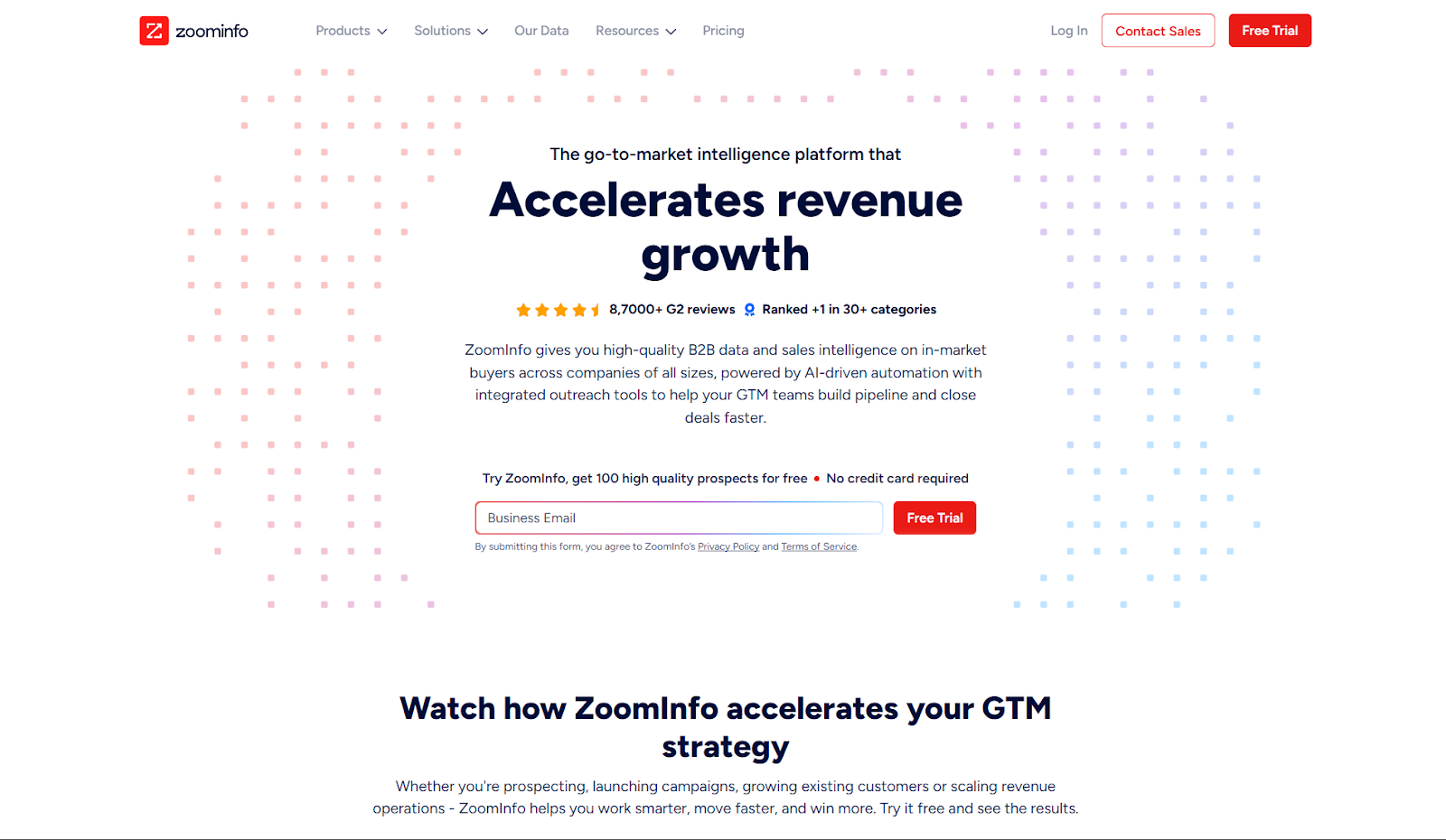
ZoomInfo provides an extensive B2B database, offering deep insights into organizations and decision-makers.
- Unique Feature: Automatically updates contact and company information, ensuring you always have the latest details.
- How It Helps with Outsourcing: You can easily identify the right decision-makers in potential outsourcing companies and gather firmographic data (industry, revenue, size) to ensure they’re a good match.
Disadvantages:
- The platform can be expensive, especially for small businesses with limited budgets.
- May require additional tools or integrations for deeper data analysis.
- A learning curve for users unfamiliar with its interface.
2. Salesloft
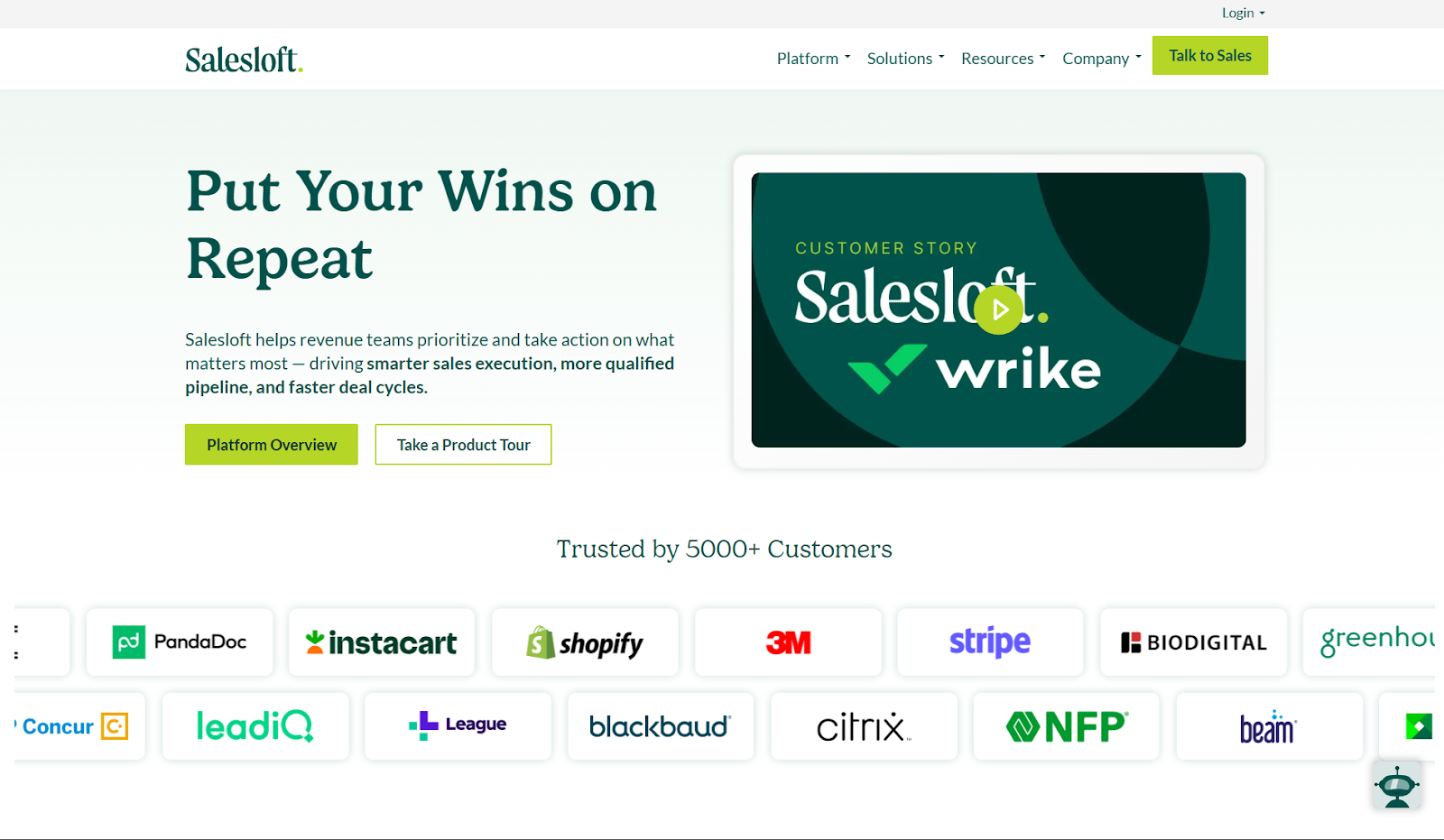
Salesloft automates various aspects of the sales process and engages with leads more effectively.
- Unique Feature: Automatically schedules follow-ups and interactions, ensuring consistent outreach with your outsourcing prospects.
- How It Helps with Outsourcing: It allows you to maintain consistent, personalized communication with multiple outsourcing candidates. So, it ensures no potential partner is overlooked.
Disadvantages:
- Over-reliance on automation can reduce personal engagement with prospects.
- Some users report a steep learning curve for advanced features.
3. Chorus.ai
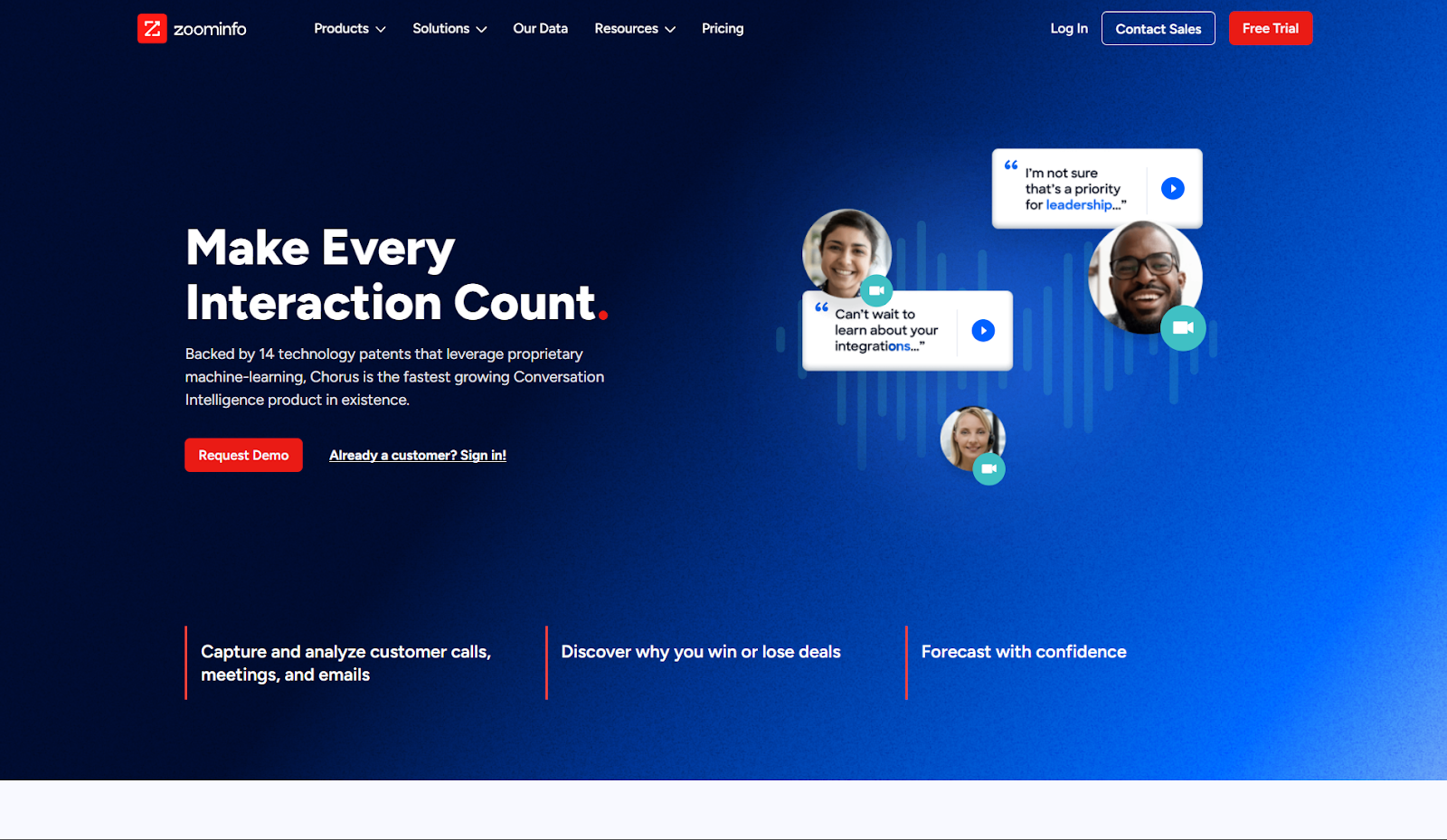
Chorus.ai offers conversation intelligence that analyzes sales meetings and calls to provide actionable insights.
- Unique Feature: Provides a detailed breakdown of sales calls, highlighting key moments and insights.
- How It Helps with Outsourcing: Use this to analyze conversations with outsourcing providers, ensuring you capture critical details early in the relationship.
Disadvantages:
- Needs a clear structure to effectively capture valuable insights from calls.
- It can be overwhelming for teams without clear processes in place for implementing feedback.
4. LinkedIn Sales Navigator
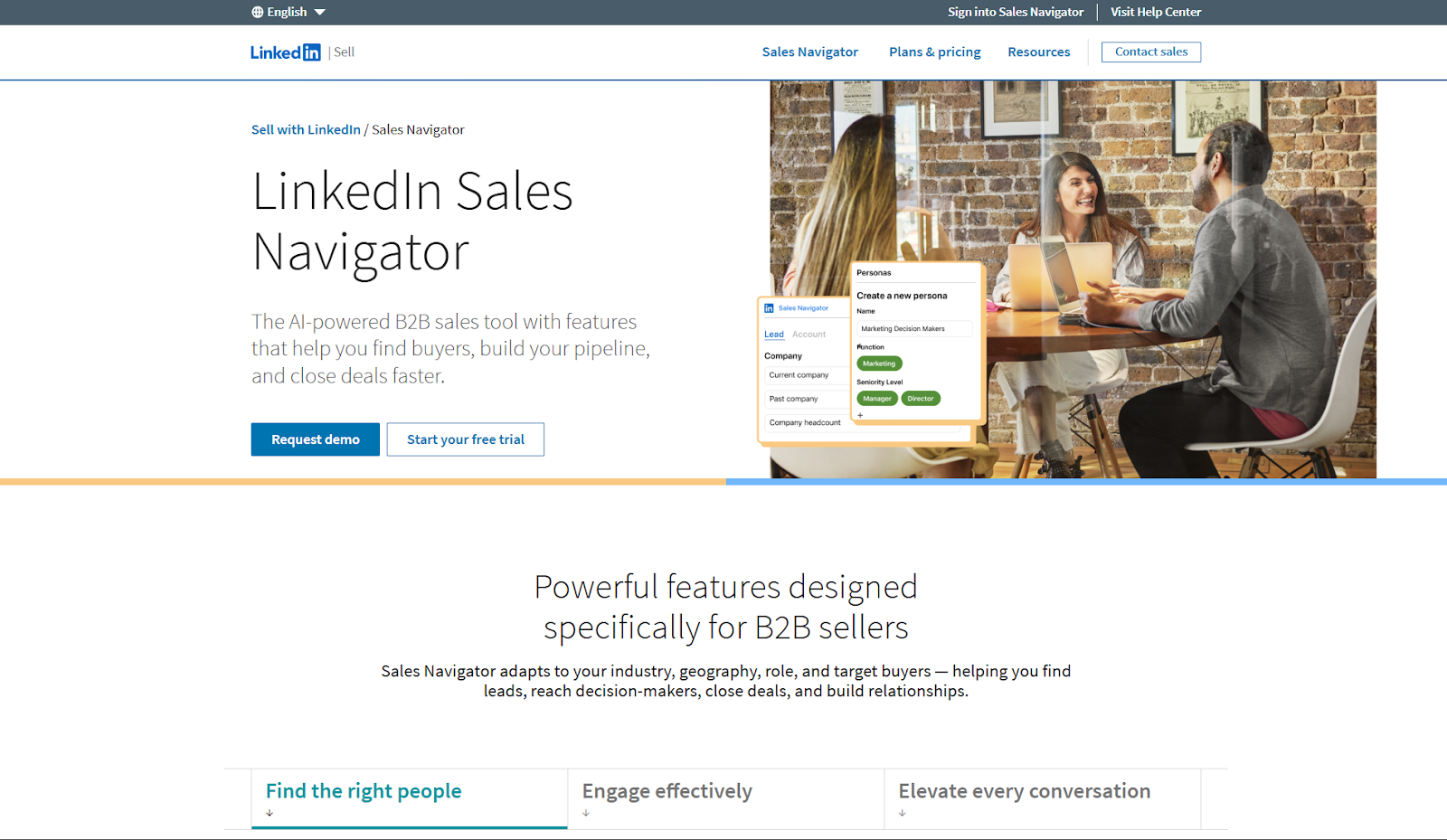
LinkedIn Sales Navigator helps businesses use LinkedIn’s vast network to find, engage, and convert potential outsourcing partners.
- Unique Feature: Allows users to find outsourcing vendors based on specific criteria such as location, company size, and industry.
- How It Helps with Outsourcing: It simplifies the process of finding qualified outsourcing partners through LinkedIn.
Disadvantages
- Requires a premium LinkedIn subscription, which can be costly.
- Limited functionality compared to other full-featured sales intelligence tools.
- Some users report that the interface is not as intuitive for beginners.
5. HubSpot Sales Hub
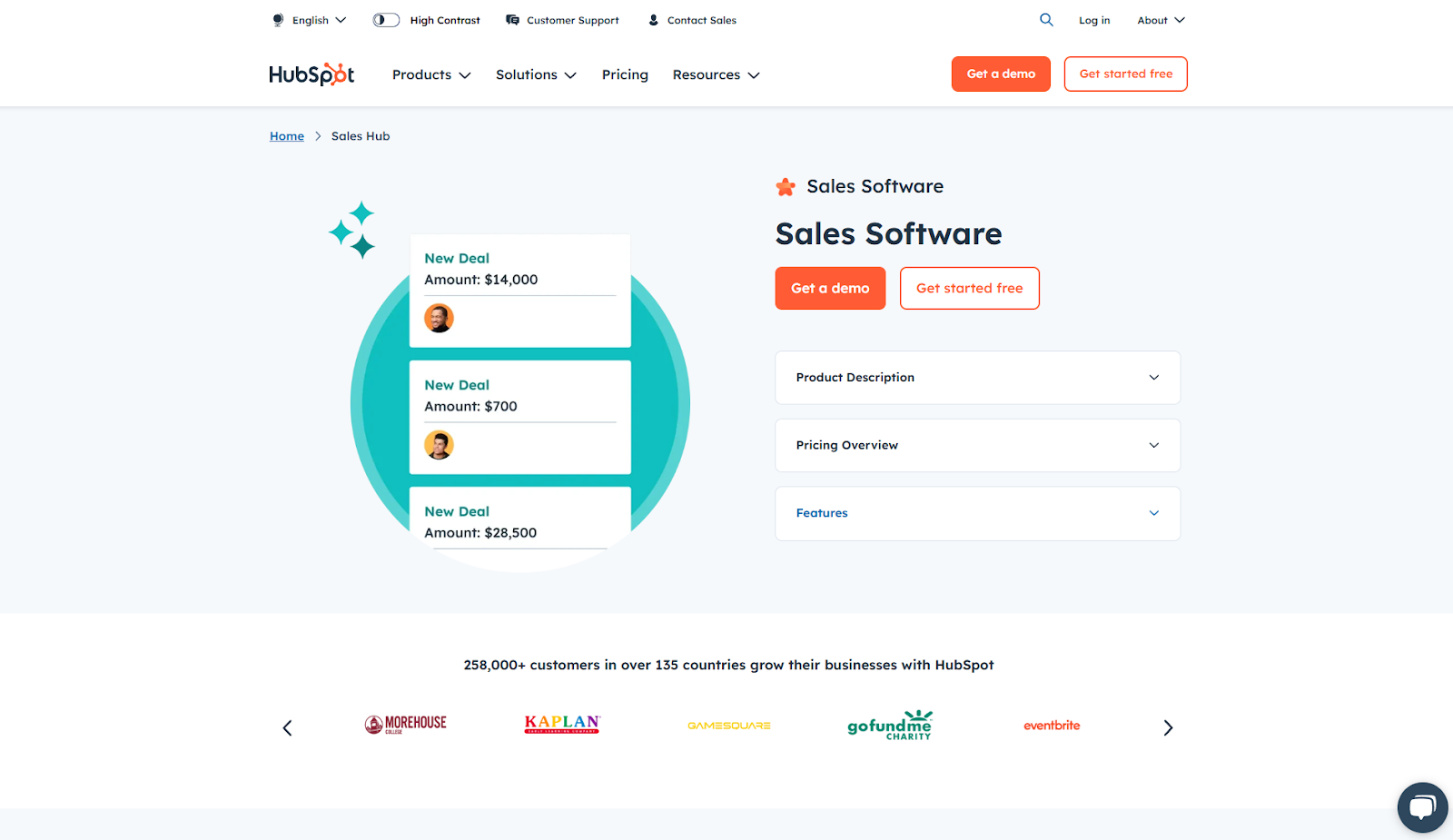
HubSpot Sales Hub is an all-in-one sales platform that combines CRM and email tracking to organize the sales process.
- Unique Feature: Tracks opens and interactions in real time, giving you immediate feedback on your outreach efforts to outsourcing vendors.
- How It Helps with Outsourcing: Helps you track engagement with outsourcing prospects through automated email campaigns.
Disadvantages:
- Some advanced features are locked behind premium plans.
- It can be overwhelming for teams with less technical experience due to the variety of tools.
- It may not offer as much customization as other dedicated sales intelligence tools.
With numerous options available, selecting the ideal sales intelligence tool for your business can be overwhelming. So, feel free to connect with Activated Scale for outsourcing sales support.
Ready to make data-driven outsourcing decisions? At Activated Scale, hiring sales talents from our Fractional Selling service helps you handle the complexities of selecting the right tools.
One Final Thought
Outsourcing decisions are high-stakes, and without the right data, they can feel like shots in the dark. Sales intelligence sheds light on this.
The key is to close your sales deal quickly, choosing the right sales intelligence tools that help your team move swiftly. So, it’s time to stop guessing and start making decisions with confidence with the above tools.
To make smarter outsourcing sales choices, book a call with Activated Scale today. With sales talent from our hiring pool, you can easily organize your sales process.
FAQs
1. How can sales intelligence help with outsourcing decisions?
Sales intelligence provides valuable insights about potential outsourcing partners. It helps businesses make data-driven decisions by analyzing firmographics and technology usage.
2. What are the key elements of sales intelligence?
The key elements include stakeholder intelligence, technology intelligence, content intelligence, account intelligence, buyer intelligence, and industry intelligence.
3. What should I look for in a sales intelligence tool?
Look for features like AI-powered insights, real-time data aggregation, CRM integration, ease of use, and strong security measures. It ensures your team can make fast decisions without the hassle of manual work.
4. Can sales intelligence tools improve outsourcing efficiency?
Yes, these tools help businesses speed up their decision-making process by allowing for quicker evaluations and more effective partner selection.
The Ultimate Guide to Hiring a Salesperson!
Get the step-by-step guide to hiring, onboarding, and ensuring success!
_edi.png)
